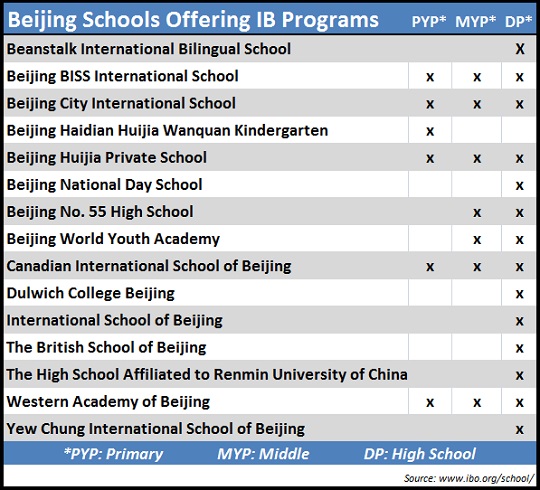
It started in Geneva as a college introductory program spearheaded by a few private schoolteachers. Now it is seen, by many, as a pinnacle of high school education — and it has taken root in Beijing’s international schools as well.
The International Baccalaureate (IB) diploma program is no longer just a niche school stream for the children of diplomats, looking for curricular consistency as their families jet from one foreign locale to the next.
Today, children from a spectrum of backgrounds are enrolling in the highly buzzed program, both abroad and in their home countries, where the “I” in its acronym is highly touted as a prime path to becoming employable in a globalized economy.
Over time the IB has also branched out from a two-year program at the tail end of high school to offering programs at the middle and primary levels as well.

In Beijing, there are 15 schools that offer one or all components of the IB, including as WAB, ISB and BCIS, as well as Dulwich, CISB and YCIS. BSB Shunyi is also a recent convert to offering the program.
In the UK, a recent Telegraph article noted that schools offering IB around the world has grown 37% since 2005 — to a total of 3,925. The number of students enrolled in the program has leaped 43 percent in the same time span, to a total of 146,519.

The piece said IB’s key attribute is its “breadth” of sixth subjects, compared to the more rigid options in England’s A-level program that prompt students to chose between sciences and arts.
One educator was quoted in the story as criticising the A-level method, saying: “ I don’t think it’s terribly sensible to specialise at 16 [years old].”
However, for all its accolades, IB is not without its detractors.
A story that ran on candgnews.com covered an evaluation of the program at a school in the US state of Michigan. One parent said he worried that IB would not adequately ready students for the science, technology, engineering and mathematics fields, “…sometimes referred to as STEM in education circles.”
The parent went on to say that: “If our society had a shortage of lawyers, diplomats, historians and linguistics experts, I would have no problem, but according to the [Michigan] governor, that’s not the case. We have a shortage of STEM-trained people.”
Some American educators gripe about IB’s international focus, and how it undermined “American exceptionalism.” Jay Mathews, an education columnist for The Washington Post, dismissed such concerns in an op-ed as “raging paranoia,” that is “completely divorced from reality.”
In particular, he was referring to the rhetoric on truthaboutib.com, a website dedicated to critiquing the IB program, coordinated by one of its biggest detractors, Lisa McLoughlin, a “…real estate broker/journalist/activist from Long Island who is leading a small but vibrant movement to stop the growth of the International Baccalaureate program in the United States.”
Aside from her critiques, rooted in American sovereignty, Matthews conceded that McLoughlin did raise some legitimate concerns, mainly that many American universities continue to give more weight to Advanced Placement (AP) program courses than IB.
But Matthews chalked this discrepancy up to ignorance on the part of the universities. The aforementioned Telegraph piece, meanwhile, argues that IB’s broader course style is a more “holistic” option that better serves its students, regardless of their career choice.
It then quoting an expert who said such well roundedness is crucial in every field, before giving an example: “"It is a worrying thought that people can go on and be scientists if they’re not able to write essays and communicate effectively.”



